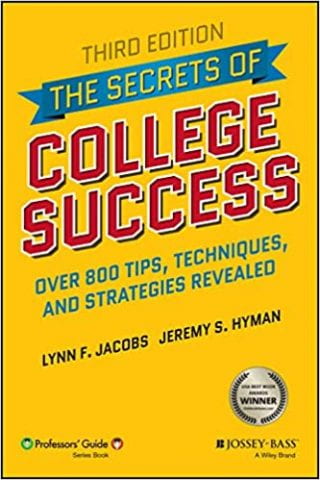Fulbright College Professors Share Their ‘Secrets of College Success’
 Editor’s Note: This story is part of our 2020 series highlighting an ongoing look at student success throughout the college journey. We want to feature great tips, resources, tools and more – all designed to help students succeed during the COVID-19 pandemic and beyond. Read more stories from the 2020 Student Success series.
Editor’s Note: This story is part of our 2020 series highlighting an ongoing look at student success throughout the college journey. We want to feature great tips, resources, tools and more – all designed to help students succeed during the COVID-19 pandemic and beyond. Read more stories from the 2020 Student Success series.
Written by Fulbright College of Arts and Sciences professors Jeremy Hyman and Lynn Jacobs, the third edition of their award-winning book The Secrets of College Success: Over 800 Tips, Techniques, and Strategies Revealed, takes on some of the hottest issues facing college students today.
And since the college experience continues to evolve, so too has the book, which now includes new sections on inclusion and diversity; microaggression; campus safety; undergraduate and collaborative research; online learning and new technologies; and study abroad, summer internships and preparation for the job market.
Often these additions, Hyman said, have come in response to express requests from readers and from various college professionals.
“The content is based on our 50-odd years of combined teaching experience at a broad variety of schools,” said Hyman, who teaches in the Department of Philosophy. “And it is presented in high-value, quick-tip format – the kind of bite-sized content that students are used to receiving.”
Hyman said that while he and Jacobs, a professor in the School of Art, write most of the pieces, when additional expertise is needed for specific sections they outsource those pieces to university professionals with other competences.
Since some 60 percent of the nation’s 22 million college students are enrolled in private colleges and state universities, while some 40 percent are attending community colleges, Hyman said the book is consciously designed to work for students at many different kinds of institutions.
Hyman also said various sections of the book have been expanded and revised, including tips on making the transition from high school to college; developing college-level study habits and motivational skills; constructing excellent papers and developing effective test-taking skills; picking a major and interfacing with the professor; and facing up to academic challenges and devising corrective action.
 For the duo, being able to relate to, empathize with, and communicate well with their students has always been at the heart of their teaching philosophy, and is one of the tips they have for fellow faculty members, too: “Imagine the other side of the interaction,” they suggest, “and your teaching will be much improved.”
For the duo, being able to relate to, empathize with, and communicate well with their students has always been at the heart of their teaching philosophy, and is one of the tips they have for fellow faculty members, too: “Imagine the other side of the interaction,” they suggest, “and your teaching will be much improved.”
“Student success is faculty success,” Hyman added, saying that the student success tips he and Jacobs have composed are intended to be a jumping off point for both beginning and continuing college students.
“We encourage students, faculty, advisers, and student success professionals to build on these tips, and to forge their own tips,” Hyman said. “To use what works and to develop a different tip if that better suits their context. There really isn’t an instruction book for college, or a one-size-fits-all solution, but we try to meet students at the so-called ‘doors’ – the interfaces between high school and college, and then between the first few years of college and the last few. We hope that the book will make college a better and more meaningful experience at every stage.”
During the current, unprecedented time of the COVID-19 pandemic, Hyman and Jacobs have created tips for the online/remote/hybrid university. Here are a few examples:
Tip #1: Know What Tech You’ll Need
It may sound a bit obvious, but technology is key. Some students, especially first-year students, don’t realize they don’t know how to access Zoom, navigate their course in Blackboard, or even have the right sort of computer (think, Chromebooks don’t work at many universities).
Scout out the course requirements before the very first meeting. And if, for some reason you are unable to get the gear, turn to your university. Often colleges have laptops to lend, hot spots to provide, and accommodations to offer students with disabilities.
 Tip #2: Don’t Forget to Connect
Tip #2: Don’t Forget to Connect
Whether taking a class in person, online, or in a hybrid format, connecting with faculty and fellow students will always be a good idea.
Meet with your adviser to plan for your next courses, make time to visit your professors during their office hours, or chat with them online. Join study groups and get to know your classmates – you never know when you might need notes, a proofreader, a study buddy, or just a good friend.
Tip #3: “Chillax”
Especially now while the pandemic is in full swing, things can get a little crazy. Students’ lives have been disrupted in so many ways – their routines, surroundings, sense of belonging, inclusion, and purpose have all been shaken this year.
So, cut yourself some slack if you make a mistake, pick yourself up, and keep going. Be kind to yourself, your colleagues, and your professors.
And, if you’re in trouble, reach out to your professors: they understand your situation and are eager to help.
For more of Hyman’s tips on online, remote and hybrid learning, check out this just-released video:
Check out our recent Back to Campus story for more student success tips from experts across the college.

